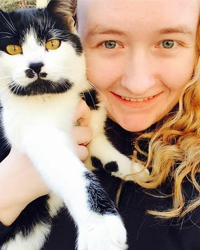What I Learn from Theater about Writing Characters
 By Irie Odessa Browning, Guest Contributor
By Irie Odessa Browning, Guest Contributor
You may not know the play, you just know you need to be under the lights again, so you show up at auditions. You sing a song in front of the director (and your competition). You stumble through the dance with a smile on your face, and then read lines from a scene or two, acting your best and projecting so the five-year-old in the back row can hear you.
Waiting comes next. You hope and pray that you didn’t fail too badly as your hands shake violently in your lap. You consider the characters you got a taste of at try-outs, wondering if maybe you’ll get the lead or the love interest… or at least ensemble.
Finally! The list is up, and you hyperventilate as you recognize the names of your friends, searching, scanning for your own until, thank goodness, there it is.
I know this cycle well. I love to act, but I’m a writer, too. One of the reasons I love acting is how it helps me develop my writing, mostly in the area of character development.
After the bolt of joy of spotting your name on the casting list comes the realization: The character name printed next to yours, you have to become them. You have to create a version of yourself that is not you anymore. The character may be similar to you, or vastly different, and both present their challenges.
Can you be like yourself, yet not quite?
Or can you create a villainous alter-ego who retains enough of you to be believable, even if you would never turn hundreds of poor townspeople out of their homes… or scream in a child’s face that it is no concern of yours whether her family lives or dies?
These questions are sobering. And they apply to writers as well.
Just as it’s normal for actors to feel daunted by the responsibility to capture the essence of a character on stage, writers feel daunted by the task of translating characters to the page. But writers have the additional complication that no one has created the character for them. They have to imagine the character and translate the character. There’s no script to work off of, and no director to tell them how they could do better.
In theater, this difficult period of discovery and trial and error is fun. As an actor, I spend almost every night for weeks and weeks at the theatre under the cold house lights, stomping or gliding or dancing around the stage, befriending my fellow actors and creating hundreds of inside jokes that no one but this cast will ever understand.
I also have the benefit of physical props and costuming. Initially, costumes can be a distraction. As an actor, I have to get into my character’s head first, so I can perform her (or him) no matter what I am wearing. Costumes don’t amount to character. But as opening draws nearer, the props come out, one by one, adding visual guides to this character you have been creating inside yourself. You wear your boots a few weeks in advance (two sizes too big but you’re capable of wearing three pairs of socks), so you can get used to dancing in them. This gradual accumulation of physical guides does help. Costuming can offer cues—reminders about what is important.
By tech week, everything comes out. Costumes are everywhere. Your face is now covered with makeup – foundation, powder, blush, eye shadow, three kinds of eyeliner, fake lashes, mascara, dirt smudges, lipstick –And and you fix your hair as the director instructs.
It’s time for dress rehearsals. The lights, the music, trying to make it as far as you can through the show without the director stopping you. You know that even if, for some reason, you blank out on your lines, at this point your character is so real to you that you can always ad lib what they’d say until you or a friend remembers where the story goes.
It’s amazing to trace the change I undergo each time I get my casting assignment. In the space of weeks, I go from knowing next to nothing about a character to being able to ad lib.
But when writing, this process is not as dramatic—not as obvious. It can be lonely and frustrating. That’s why I think the experience of acting—of being part of a theatrical production in some way—can bring energy to the challenge of creating and writing characters.
If the fun of preparing for a play makes the hard work of getting to know a character easier and more rewarding, why not anticipate that by adding fun to my writing process?
If visual guides in the form of costuming and props and set pieces help me remember what matters for a character, why not incorporate visual—or other sensory—guides as I try to write from a character’s point of view? As I admitted, these physical cues can be distracting if you use them in place of the hard work of inventing your character, but as cues, they can add a dimension of reality that helps you really immerse yourself in the scene.
And if the support of other actors, all of whom are excited and stressed and passionate about the play, makes the preparation as much fun as the performance, I think there is something to be learned from that about writing rough drafts as well. As writers, we need each other. For support, but also to undertake the journey of writing a book not so much a lonely solo traveler but as a band of adventurers.
And there’s something to be learned from the shows themselves, too.
Opening night: These kids who were strangers ten weeks ago now have become great friends as you worked towards the common goal of this show. The lights blind you to the audience, and you take a deep breath and dive into your character’s voice. All this preparation, the practice, finding the right voice to speak in, the proper way of walking, the facial expressions, the words to emphasize, the costume, the shoes, the hair, the makeup—it’s all finally together, played out before a paying audience. Maybe the house only sells out once in the three-week run. Maybe it sells out every show.
Closing night arrives. You bow for the last time, you turn in your costume and jewelry, you scrub the makeup off of your face. You’re given a job or two (or twelve) to help with striking the set, and then it’s time for the final party, a good-bye to not only your friends, but your character as well.
Even if this play is performed again, it will never be the same. Never will that exact group of people, and the characters they brought to life, be all together once more. It’s over.
Except it’s not, not really. Every time a play is performed – or a story is read – characters change and develop in different ways. Your fifth time reading a book, or writing your own novel, or playing a character in a show – they will be different. They will change. Characters don’t stay the same, even written in ink. They are a part of a writer’s soul, and become a part of the reader’s heart, and no one who experiences a good character will be quite the same afterwards.
That is why I write, why I read, and why I act.
…
Have you ever learned something about writing by participating in another type of artistic activity?
…
Irie Odessa Browning lives in Washington State, and draws much inspiration for her writing from her family’s cats and the pine tree forests where she spent her childhood. She loves theatre almost as much as she loves cats, and is currently in the ensemble of a local theatre’s production of Mary Poppins. She blogged a bit last summer at The Hobbit of Oz, and plans to write some more posts this summer once the theatre season is over.
* Please note that links on The One Year Adventure Novel Blog to other websites and blogs do not constitute an official endorsement. We are not intimately familiar with all the writing and opinions contained in outside links.




Love this! 🙂 This is true on so many levels.
A practically perfect write up about theater in relation to writing! *applauds* I recently learned a LOT by playing the role of Kate Keller in the The Miracle Worker recently. It was the most challenging role I’ve done so far. A character so much like me and yet not(learning the accent was fun).
I noticed you’re currently in Mary Poppins=D Its one of my favorite musicals and I’m doing it right now, too(my first lead role)! I’m so excitedX}